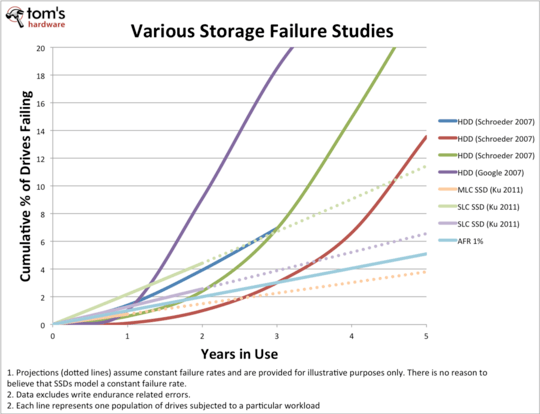11
3
I am in need of backing up some photos from all the phones in the family to a safe location.
I am considering buying just a normal HDD, but I think that an SSD is also an option here?
I know that SSD's don't have any moving parts and can survive any falls while HDD's tend to be very sensetive to shocks etc..
I tried to lookup some information on what is safer to use for a backup: HDD or SSD?
But all the information found is old (2011/2012) and most of them talk only about data-recovery from a failed drive, not actual backup purposes. SSD's have advanced pretty much in meantime so I think this is a question worth re-asking on the internet:
Is it safer to use an SSD for backup purposes or use an HDD instead?
i.e.:
I have to admit that the idea of an SSD surviving a rough "ride" is very convincing but I have heard SSD's last only 5 years whilst HDD's last much longer (10+ years before the data starts to degrade)?
Non-opinion update:
Question: What is the difference between HDD and SSD data retention rates when the drive sits unused/unread for 5, 10, 20, 50 years? Does the charge "evaporate" leaving the data unreadable?
Question can now be answered without opinions.

2>
A backup doesn't have to be especially reliable. If the drive fails, replace it, then run your backup routine again. – Jason – 2014-08-12T18:11:27.073
@Jason - I am not sure I agree. Of course a single backup does nobody any good since thats a single point of failure. – Ramhound – 2014-08-12T18:24:20.137
3@Ramhound By definition, any backup isn't a single point of failure. If something goes wrong you have two points: the original, and the backup. If you're talking about archiving/external storage, that's an entirely different subject. – Jason – 2014-08-12T18:31:30.300
Why not use DVDs? – Keltari – 2014-08-12T18:33:35.167
1
@Keltari Not DVDs, M-Discs. :)
– Ƭᴇcʜιᴇ007 – 2014-08-12T19:00:16.5631For backup purposes, the issue isn't how long the device lasts in use, it's how long the data on it is readable when the device is not in use. Data on a hard drive lasts longer than data on an unpowered SSD. – fixer1234 – 2019-12-20T22:18:01.427